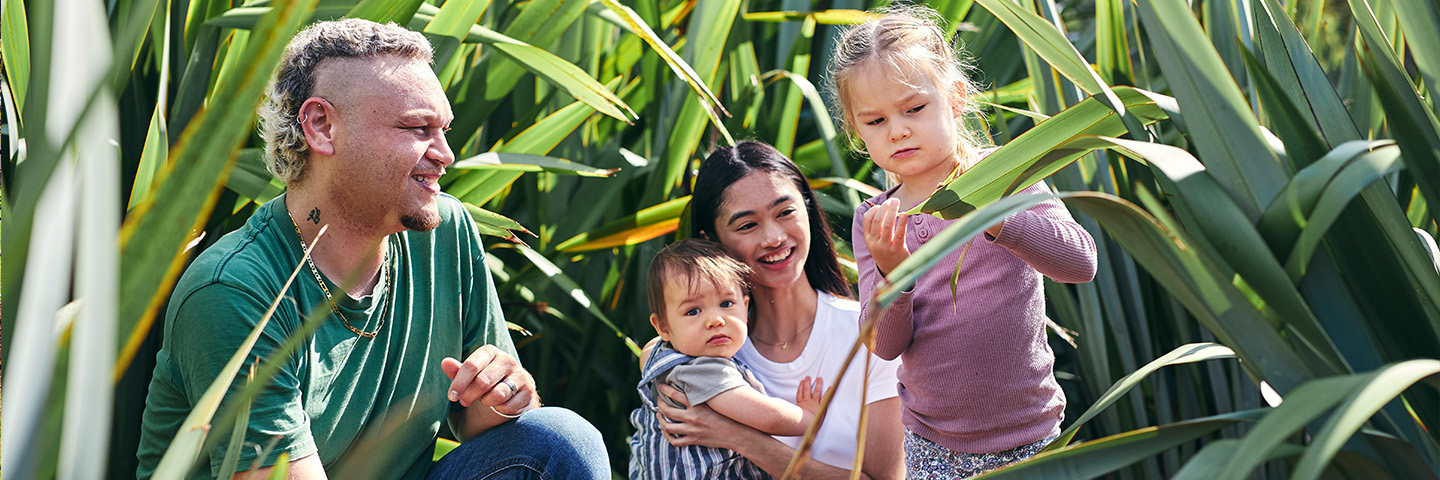Programme overview
In this practical, field-based programme, you will develop the skills required to become a competent, informed, and reflective early childhood teacher who is committed to young children and their learning and development.
You can earn while you learn, by working at least 12 hours a week in an early childhood centre from the beginning of your degree, plus spending 2 days a week on campus, where you will learn to relate your teaching practice to theory. Our staff are always on hand to provide pastoral care, and there are also numerous student support services available on campus.
You’ll also experience a range of practicum placements through 10 week placements at your own early childhood centre and 12 week placements at our designated early childhood centre over three years. When you graduate, you’ll be eligible to become a registered teacher in Aotearoa New Zealand.
Highlights
- Become a qualified early childhood teacher: you will be able to apply for teacher registration with the Teaching Council of Aotearoa New Zealand;
- Emphasis on teaching practice: work (paid or voluntary) in a local licensed early childhood centre for at least 12 hours per week during the programme. This means that there will be a 50:50 ratio of theory to practice, ensuring our graduates are industry ready.
- Experience teaching in a range of centres: each year you will also take part in a practicum, at an early childhood education centre for 37.5 hours per week;
- Our graduates had an employment success rate of over 90% in the past years;
- A focus on research: you will design an action research project in an area of interest, carry it out during your work experience, then reflect upon how it’s impacted on your practice
- A strong emphasis on mātauranga Māori and the Aotearoa New Zealand early childhood curriculum document, Te Whāriki, with a commitment to a bicultural and sociocultural learning approach
Professional Work Experience Requirement
You will complete at least 12 hours (paid or voluntary) work experience per week, over 22 weeks during term times. If you are not currently employed, we can guide you to locate an appropriate centre close to your home.
Practicum
Year One: You will complete one 2-week practicum in your first semester at the centre where you are on work experience. You will also complete one four-week practicum at the end of the year at another centre, chosen by Unitec in accordance with Teaching Council requirements.
Years Two and Three: You will complete two four week practicum per year, one in your home centre and one in another centre, as chosen by Unitec in accordance with Teaching Council requirements.
Admission requirements
What you will need to study this programme.
Domestic students
Academic requirements
You must have completed the following:
- NCEA entry requirements;
- 14 credits at NCEA Level 3 in three approved subjects;
- 10 credits at NCEA Level 2 or higher in English or Māori (5 in reading, 5 in writing)
- 10 credits at NCEA Level 1 or higher in Mathematics or Pangarau
- Complete and pass a short numeracy and literacy test
(Note: Applies to applicants who do not meet the general admission requirements and who have not reached the age of 20 . You can find more information on special or discretionary)
- University Entrance Literacy: 10 credits at Level 2 or above in English or Māori (5 in Reading, 5 in Writing); or
- Evidence of English language proficiency as outlined in the NZQA Rules on the Unitec English Language Requirements for International Students Web-page.
Don’t meet these Academic requirements?
- If you don’t meet the academic criteria, our Bridging Education Programmes and English Language programmes available can help you qualify. Apply online, and we’ll be in touch about your next steps.
- If you don’t meet the above criteria, special or discretionary admission may apply; your eligibility will be determined at the interview.
Non-academic requirements
When you apply for this programme, you must provide proof of your certified identity (ID) and other documents, such as academic certificates. Please have these handy when you’re ready to apply.
See what documents you may need to provide
As part of your application, you’ll also need to consent to a Safety Check, which could involve providing:
- Two forms of identification, including proof of any name changes
- A self-declaration of medical conditions and criminal convictions
- Contact details for two referees
- Your curriculum vitae (CV)
- Consent to an NZ Police Check (PDF, 878KB)
- Attending an interview
In some instances, the information collected may be shared with workplace placement providers.
For more information, download the programme regulations (PDF 481 KB)
International students
Academic requirements
As a part of this requirement, you must be at least 17 years of age and meet one of the country-specific admission requirements;
And English entry requirements;
If English is not your first language, you will also need at least one of the following qualifications:
- Evidence of an overall IELTS (Academic) band score of at least 7.0 in each band; or
- University Entrance Literacy: 10 Credits at NCEA Level 2 or above in English or Maori (5 in reading, 5 in writing); or
- Evidence of English language proficiency as outlined in the NZQA Rules on the Unitec English Language Requirements for International Students Web-page.
- *In exceptional cases, Unitec can request an exemption from the Teaching Council for students who can’t provide standard English language evidence but demonstrate a high level of English proficiency through alternative means.
Check the Teaching Council Website for more information about ESOL requirements.
Don’t meet these Academic requirements?
- If you don’t meet the academic criteria, our Bridging Education Programmes and English Language programmes available can help you qualify. Apply online, and we’ll be in touch about your next steps.
- If you don’t meet the above criteria, special or discretionary admission may apply; your eligibility will be determined at the interview.
Non-academic requirements
When you apply for this programme, you must provide proof of your certified identity (ID) and other documents, such as academic certificates. Please have these handy when you’re ready to apply.
See what documents you may need to provide
As part of your application, you’ll also need to consent to a Safety Check, which could involve providing:
- Two forms of identification, including proof of any name changes
- A self-declaration of medical conditions and criminal convictions
- Contact details for two referees
- Your curriculum vitae (CV)
- Consent to an NZ Police Check (PDF, 878KB)
- Attending an interview
In some instances, the information collected may be shared with workplace placement providers.
For more information, download the programme regulations (PDF 481 KB)
Courses and timetables
For more details on the courses including timetables, please click on the course names below.
Debug
| Courses | Credits | Aim |
|---|---|---|
| Hauora(EDUC5000) | 15.0 credits (0.125 EFTS) | This course examines models of health and well-being to develop the skills and knowledge of effective practices to promote holistic health and well-being for self and others within the learning community. |
| Introduction to Te Whariki(EDUC5001) | 15.0 credits (0.125 EFTS) | This course introduces Te Whariki as an integrated curriculum to underpin the facilitation of learning and development. |
| Human Development(EDUC5002) | 15.0 credits (0.125 EFTS) | This course explores theories of human development and analyses the implications for practice in early childhood contexts in Aotearoa. |
| Integrated Curriculum(EDUC5003) | 15.0 credits (0.125 EFTS) | This course develops knowledge and understanding of play-based learning within an integrated curriculum. |
| Partnership, Perspectives and Policy(EDUC5004) | 15.0 credits (0.125 EFTS) | This course examines historical and socio-cultural contexts of early childhood education in Aotearoa, introducing the policy and legislation, and the importance of Te Tiriti o Waitangi based practices in early childhood education. |
| Te Kete Manaaki Tangata(EDUC5005) | 15.0 credits (0.125 EFTS) | This course develops understandings of te reo me nga tikanga Māori in relation to manaaki tangata. |
| Teachers as Partners(EDUC5006) | 15.0 credits (0.125 EFTS) | This course develops knowledge, skills and attitudes required for early childhood kaiako to work in professional partnership with kaiako, whānau and community. |
| Introduction to Professional Experience(EDUC5007) | 15.0 credits (0.125 EFTS) | This course supports students in partnership with an early childhood service to demonstrate teaching and professional practices that recognise the integrated nature of the learning of tamariki. |

